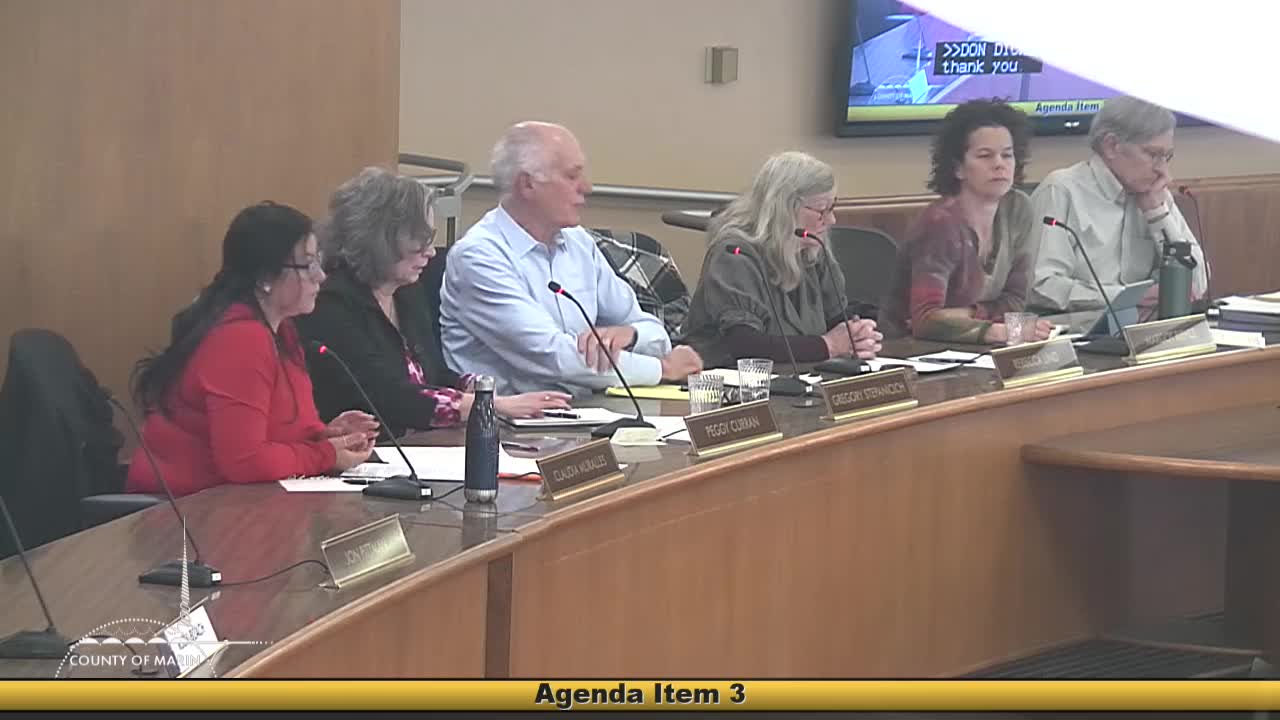Planning Commission hears overview of 2024–25 housing laws; ADU, SB9 and conversion rules to prompt local code changes
Get AI-powered insights, summaries, and transcripts
Subscribe
Summary
County planning staff summarized roughly a dozen housing law changes — including AB 93's expansion of the Housing Accountability Act, major ADU changes and AB 2243's widening of commercial‑to‑residential conversions — and outlined steps the county must take to align local code and procedures, with some rules already in effect.
Marin County planning staff gave commissioners a walkthrough of recent state housing laws that took effect this year and described how the county expects to respond.
Manny, who led the briefing, said the governor signed 62 housing‑related laws that took effect early this year and the presentation focused on five areas covering about a dozen laws that are most likely to affect county procedures and the development code.
Housing Accountability Act and builders' remedy: Manny said AB 93 expands the Housing Accountability Act (HAA), adding new categories of potential violations for local governments and expressly incorporating builders' remedy protections into HAA. "AB 93 expands the housing accountability act in many ways," Manny said, describing changes to application completeness rules and procedural limits on how jurisdictions can deem an application incomplete.
Accessory Dwelling Units (ADUs): Staff described substantial ADU changes. For existing multifamily properties the presentation said the new law allows more detached ADUs on site (presentations cited a theoretical maximum of up to eight detached ADUs in some configurations and up to 25% additional units inside existing buildings, with limits tied to the number of primary units). Manny also summarized expanded amnesty provisions and said counties must adjust development codes to reflect state changes. On enforcement, staff said pre‑2020 units seeking legalization can be subject only to life‑and‑safety upgrades rather than full current standards, and retroactive fee rules may limit local collection depending on who initiates compliance.
SB9, demolition and oversight: Staff reviewed SB9 streamlining clarifications, including a 60‑day deadline to act on completed SB9 applications and a narrowed demolition allowance in some cases, which can conflict with SB 330 provisions requiring replacement housing in demolitions. Manny noted HCD (state Housing and Community Development) will begin overseeing SB9 ordinances in 2027.
Commercial‑to‑residential conversions (AB 2243): Staff said AB 2243 (which the county had earlier adopted under AB 2243) now allows larger parking lots and regional malls to qualify for conversion to residential uses and removed a prior 500‑foot Highway 101 exclusion; the law reduces or waives parking replacement requirements for some conversions, potentially opening more corridors for housing conversions.
Implementation and next steps: Staff said many provisions are already effective (for example, recent ADU changes). The county will review all laws to determine necessary local code amendments; staff proposed drafting code updates and bringing consolidated amendments to the commission in October to incorporate changes from last year and this year. Manny said some laws already in effect will require immediate compliance by staff and developers.
Questions from commissioners focused on fee collection for legalized ADUs (whether retroactive connection fees could be waived by other agencies such as water districts), how the county would verify eligibility dates for amnesty, and how conflicts between state laws (SB9 vs SB 330 or demolition rules) will be resolved. Manny and other staff said some conflicts are unresolved and might ultimately be clarified by state agencies or courts, and the county plans to seek to harmonize local procedures with state law where possible.
Ending: Staff asked commissioners to watch for upcoming public workshops (including a potential special hearing if state agencies respond in time) and said code amendment drafts will follow later in the year.
